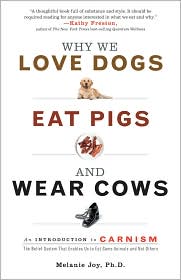
Why We Love Dogs, Eat Pigs, and Wear Cows is an examination and discussion of how early conditioning and ongoing messages from the meat industry work together to keep specific animals on our menus despite the horrific practices involved with getting that meat there.
This is a potentially controversial book, and my review may well generate a great deal of debate. I state this at the outset because I did not love this book and I am an omnivore. That said, I think Ms. Joy’s basic premise is correct: most Americans eat meat because they are disassociated from the process by which specific animals go from birth to death. This disassociation allows them to identify some animals as ‘never to eat; treat well and lovingly’ and others as ‘ok to eat; treat badly and cruelly’. To discuss meat eating on the same field as vegetarianism, she created a new word: carnism.
Overall the writing is good, although it occasionally reads like the doctoral thesis that was its original version (that is, wordy, repetitive, and a bit convoluted). Its sources are well-referenced and the book is well-paced, taking the reader into specific areas with well-placed signposts.
Moreover, this is (to my knowledge) the only book that discusses carnism as an ideology opposite to vegetarianism. That alone makes this an important work. It may be the first, but it will always be ground breaking. Ms. Joy also does a wonderful job acknowledging the suffering of slaughterhouse workers and other meat industry workers.
Nonetheless, I have serious disagreements with Ms. Joy’s argument. (The comments in parenthesis are my personal responses.)
- She completely ignores people who raise animals for personal or commercial consumption in perfectly humane conditions. Also ignored are people who hunt for food and those people who have health issues that make a vegetarian diet impractical or detrimental. (Too few to matter, perhaps.)
- She goes too far in asserting a kind of grand societal conspiracy that trains us, lulls us, and rewards us as meat eaters. (Because we need another conspiracy explaining why otherwise reasonable, intelligent people act like sheep.)
- She asserts that eating meat requires intensely convoluted and psychically damaging mental maneuvers. (Because anyone who eats meat must be psychically damaged.)
- She does not sufficiently convince me that meat-eating is an ideology. (I agree that carnism is an ideology, but the subject and reasoning behind eating meat is not.)
- She falls too easily into the trap of guilt tripping and I could easily see the need to convert seeping through.
- She ties carnism to other "violent ideologies" and provides examples of how it leads to sexism, racism, and colonialist systems of oppression. (WTF?)
- Last, but not least, she made a huge mistake in comparing carnists to Nazis. If only for the upholding of Godwin’s Law , but also because that is extremely poor rhetoric: eat meat and you are evil.
I suspect that vegetarians will find Ms. Joy’s arguments, logical, convincing, and morally compelling; carnists will not. Carnists may, however, feel prompted to examine the origins of their meat, and may make different decisions about what they find acceptable. So, is it the book I want to give to those around me who may need to have their eyes opened to the cruelties of the meat-processing industry? No, there are better books for that (including Omnivore’s Dilemna).
Author: Melanie Joy, Ph.D.
Conari Press, 2010
pp. 204, $19.95
